Organisational Learning and Learning Organisation Report
VerifiedAdded on 2022/12/27
|12
|3190
|31
Report
AI Summary
This report provides a detailed analysis of organisational learning and learning organisations. It begins by defining organisational learning and its importance, including its role in creating, retaining, and transferring knowledge within a company. The report explores organisational learning theory, emphasizing the importance of knowledge sharing and continuous learning. It then presents the organisational learning model, including single-loop, double-loop, and deutero learning. The advantages and disadvantages of organisational learning are discussed, followed by a definition of a learning organisation and its key features, such as open communication, teamwork, and shared vision. The advantages and disadvantages of a learning organisation are also outlined. Finally, the report clarifies the relationship and differences between organisational learning and a learning organisation, highlighting the critical role of learning in fostering competition and flexibility within an organisation, and the need for adaptability in a dynamic environment. The report concludes by emphasizing the need for continuous learning and development for organisational success.
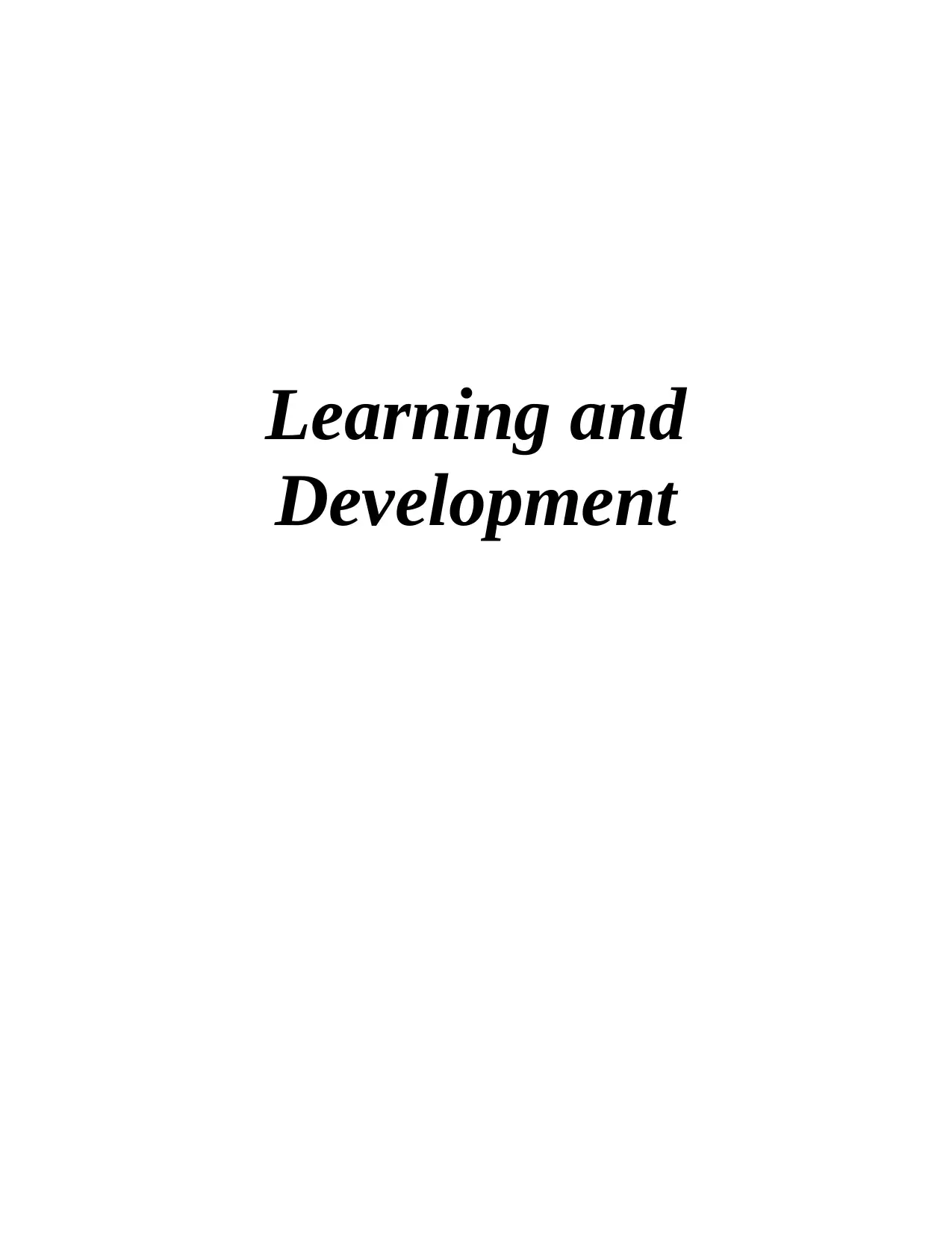
Learning and
Development
Development
Paraphrase This Document
Need a fresh take? Get an instant paraphrase of this document with our AI Paraphraser
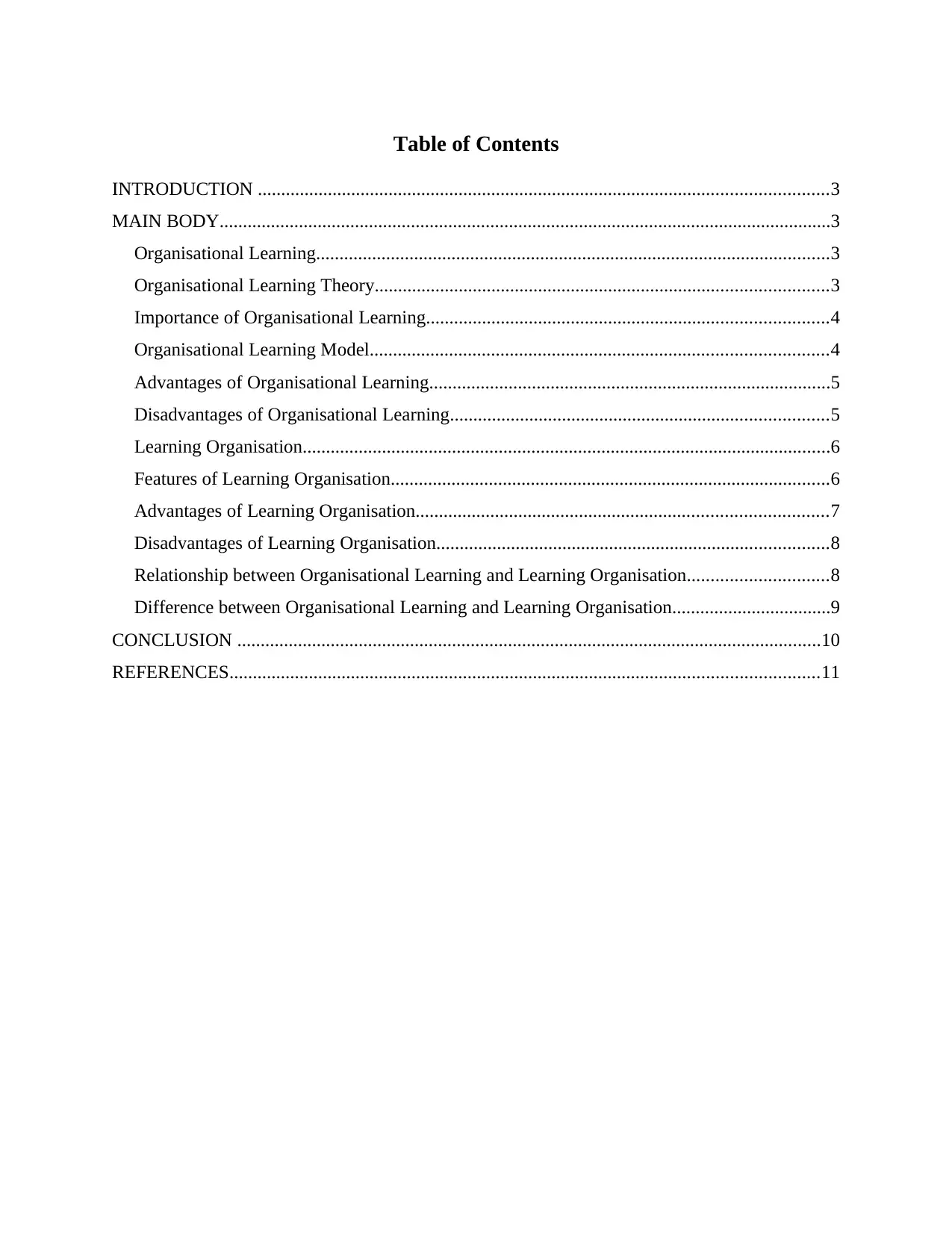
Table of Contents
INTRODUCTION ..........................................................................................................................3
MAIN BODY...................................................................................................................................3
Organisational Learning..............................................................................................................3
Organisational Learning Theory.................................................................................................3
Importance of Organisational Learning......................................................................................4
Organisational Learning Model..................................................................................................4
Advantages of Organisational Learning......................................................................................5
Disadvantages of Organisational Learning.................................................................................5
Learning Organisation.................................................................................................................6
Features of Learning Organisation..............................................................................................6
Advantages of Learning Organisation........................................................................................7
Disadvantages of Learning Organisation....................................................................................8
Relationship between Organisational Learning and Learning Organisation..............................8
Difference between Organisational Learning and Learning Organisation..................................9
CONCLUSION .............................................................................................................................10
REFERENCES..............................................................................................................................11
INTRODUCTION ..........................................................................................................................3
MAIN BODY...................................................................................................................................3
Organisational Learning..............................................................................................................3
Organisational Learning Theory.................................................................................................3
Importance of Organisational Learning......................................................................................4
Organisational Learning Model..................................................................................................4
Advantages of Organisational Learning......................................................................................5
Disadvantages of Organisational Learning.................................................................................5
Learning Organisation.................................................................................................................6
Features of Learning Organisation..............................................................................................6
Advantages of Learning Organisation........................................................................................7
Disadvantages of Learning Organisation....................................................................................8
Relationship between Organisational Learning and Learning Organisation..............................8
Difference between Organisational Learning and Learning Organisation..................................9
CONCLUSION .............................................................................................................................10
REFERENCES..............................................................................................................................11
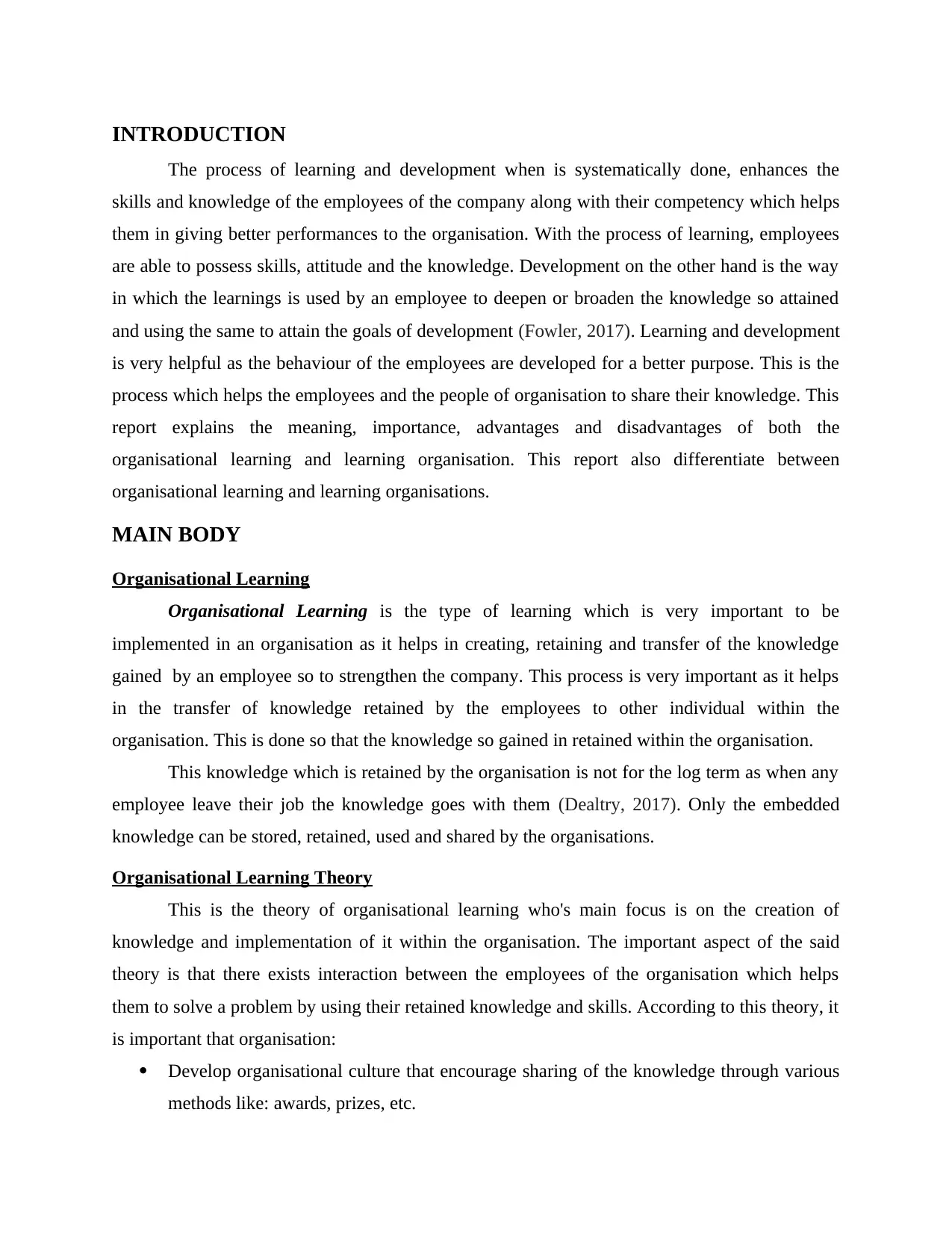
INTRODUCTION
The process of learning and development when is systematically done, enhances the
skills and knowledge of the employees of the company along with their competency which helps
them in giving better performances to the organisation. With the process of learning, employees
are able to possess skills, attitude and the knowledge. Development on the other hand is the way
in which the learnings is used by an employee to deepen or broaden the knowledge so attained
and using the same to attain the goals of development (Fowler, 2017). Learning and development
is very helpful as the behaviour of the employees are developed for a better purpose. This is the
process which helps the employees and the people of organisation to share their knowledge. This
report explains the meaning, importance, advantages and disadvantages of both the
organisational learning and learning organisation. This report also differentiate between
organisational learning and learning organisations.
MAIN BODY
Organisational Learning
Organisational Learning is the type of learning which is very important to be
implemented in an organisation as it helps in creating, retaining and transfer of the knowledge
gained by an employee so to strengthen the company. This process is very important as it helps
in the transfer of knowledge retained by the employees to other individual within the
organisation. This is done so that the knowledge so gained in retained within the organisation.
This knowledge which is retained by the organisation is not for the log term as when any
employee leave their job the knowledge goes with them (Dealtry, 2017). Only the embedded
knowledge can be stored, retained, used and shared by the organisations.
Organisational Learning Theory
This is the theory of organisational learning who's main focus is on the creation of
knowledge and implementation of it within the organisation. The important aspect of the said
theory is that there exists interaction between the employees of the organisation which helps
them to solve a problem by using their retained knowledge and skills. According to this theory, it
is important that organisation:
Develop organisational culture that encourage sharing of the knowledge through various
methods like: awards, prizes, etc.
The process of learning and development when is systematically done, enhances the
skills and knowledge of the employees of the company along with their competency which helps
them in giving better performances to the organisation. With the process of learning, employees
are able to possess skills, attitude and the knowledge. Development on the other hand is the way
in which the learnings is used by an employee to deepen or broaden the knowledge so attained
and using the same to attain the goals of development (Fowler, 2017). Learning and development
is very helpful as the behaviour of the employees are developed for a better purpose. This is the
process which helps the employees and the people of organisation to share their knowledge. This
report explains the meaning, importance, advantages and disadvantages of both the
organisational learning and learning organisation. This report also differentiate between
organisational learning and learning organisations.
MAIN BODY
Organisational Learning
Organisational Learning is the type of learning which is very important to be
implemented in an organisation as it helps in creating, retaining and transfer of the knowledge
gained by an employee so to strengthen the company. This process is very important as it helps
in the transfer of knowledge retained by the employees to other individual within the
organisation. This is done so that the knowledge so gained in retained within the organisation.
This knowledge which is retained by the organisation is not for the log term as when any
employee leave their job the knowledge goes with them (Dealtry, 2017). Only the embedded
knowledge can be stored, retained, used and shared by the organisations.
Organisational Learning Theory
This is the theory of organisational learning who's main focus is on the creation of
knowledge and implementation of it within the organisation. The important aspect of the said
theory is that there exists interaction between the employees of the organisation which helps
them to solve a problem by using their retained knowledge and skills. According to this theory, it
is important that organisation:
Develop organisational culture that encourage sharing of the knowledge through various
methods like: awards, prizes, etc.
⊘ This is a preview!⊘
Do you want full access?
Subscribe today to unlock all pages.

Trusted by 1+ million students worldwide
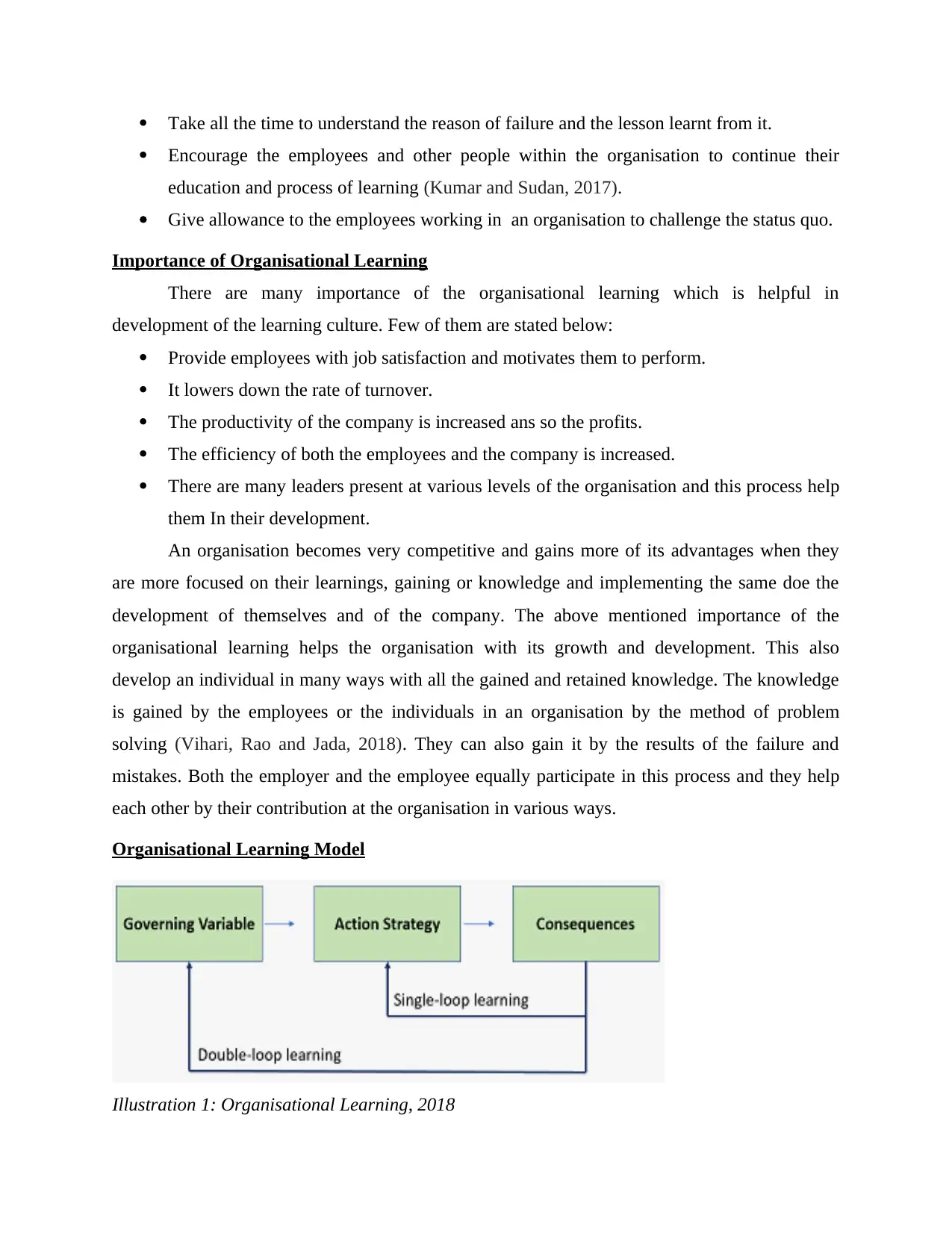
Take all the time to understand the reason of failure and the lesson learnt from it.
Encourage the employees and other people within the organisation to continue their
education and process of learning (Kumar and Sudan, 2017).
Give allowance to the employees working in an organisation to challenge the status quo.
Importance of Organisational Learning
There are many importance of the organisational learning which is helpful in
development of the learning culture. Few of them are stated below:
Provide employees with job satisfaction and motivates them to perform.
It lowers down the rate of turnover.
The productivity of the company is increased ans so the profits.
The efficiency of both the employees and the company is increased.
There are many leaders present at various levels of the organisation and this process help
them In their development.
An organisation becomes very competitive and gains more of its advantages when they
are more focused on their learnings, gaining or knowledge and implementing the same doe the
development of themselves and of the company. The above mentioned importance of the
organisational learning helps the organisation with its growth and development. This also
develop an individual in many ways with all the gained and retained knowledge. The knowledge
is gained by the employees or the individuals in an organisation by the method of problem
solving (Vihari, Rao and Jada, 2018). They can also gain it by the results of the failure and
mistakes. Both the employer and the employee equally participate in this process and they help
each other by their contribution at the organisation in various ways.
Organisational Learning Model
Illustration 1: Organisational Learning, 2018
Encourage the employees and other people within the organisation to continue their
education and process of learning (Kumar and Sudan, 2017).
Give allowance to the employees working in an organisation to challenge the status quo.
Importance of Organisational Learning
There are many importance of the organisational learning which is helpful in
development of the learning culture. Few of them are stated below:
Provide employees with job satisfaction and motivates them to perform.
It lowers down the rate of turnover.
The productivity of the company is increased ans so the profits.
The efficiency of both the employees and the company is increased.
There are many leaders present at various levels of the organisation and this process help
them In their development.
An organisation becomes very competitive and gains more of its advantages when they
are more focused on their learnings, gaining or knowledge and implementing the same doe the
development of themselves and of the company. The above mentioned importance of the
organisational learning helps the organisation with its growth and development. This also
develop an individual in many ways with all the gained and retained knowledge. The knowledge
is gained by the employees or the individuals in an organisation by the method of problem
solving (Vihari, Rao and Jada, 2018). They can also gain it by the results of the failure and
mistakes. Both the employer and the employee equally participate in this process and they help
each other by their contribution at the organisation in various ways.
Organisational Learning Model
Illustration 1: Organisational Learning, 2018
Paraphrase This Document
Need a fresh take? Get an instant paraphrase of this document with our AI Paraphraser
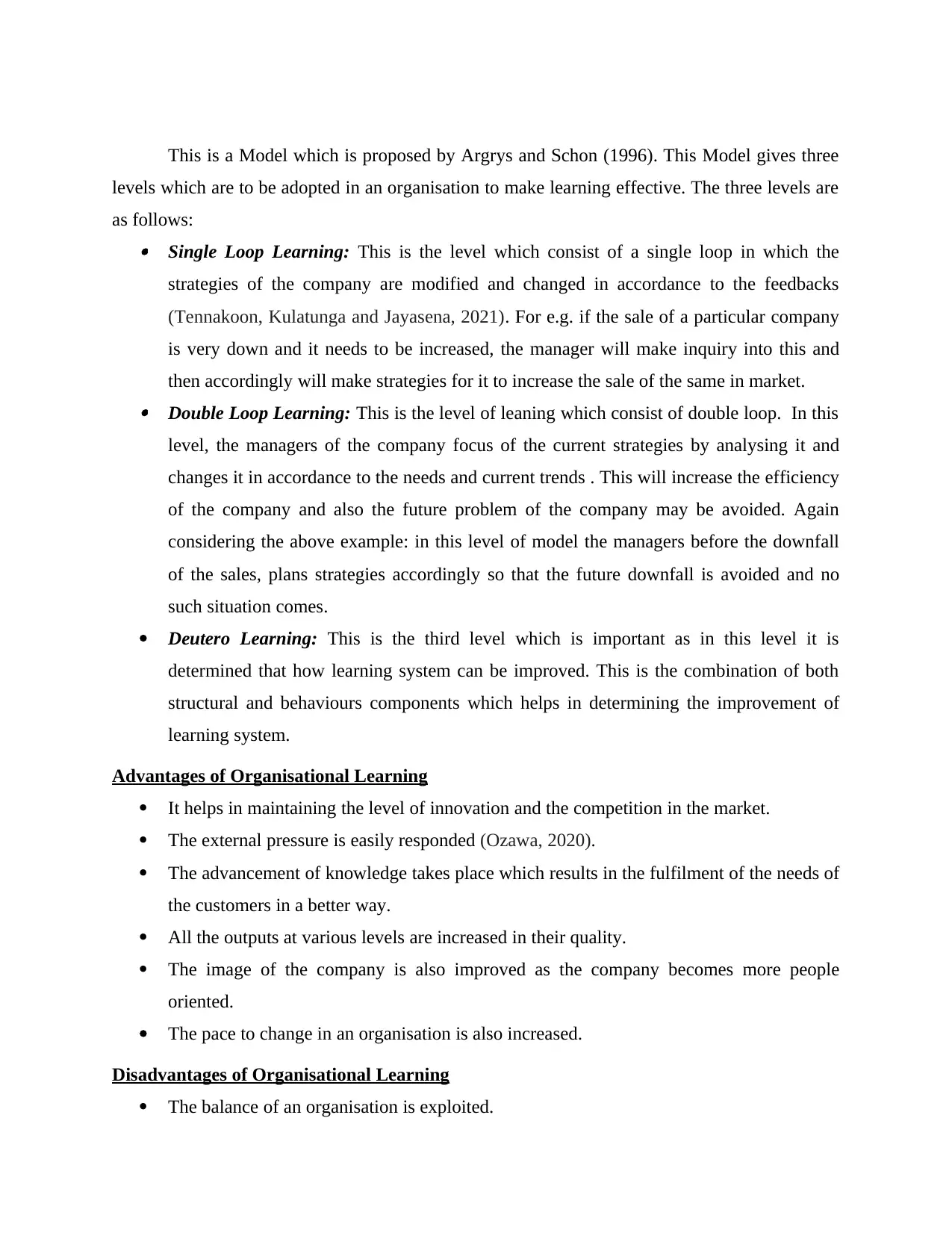
This is a Model which is proposed by Argrys and Schon (1996). This Model gives three
levels which are to be adopted in an organisation to make learning effective. The three levels are
as follows: Single Loop Learning: This is the level which consist of a single loop in which the
strategies of the company are modified and changed in accordance to the feedbacks
(Tennakoon, Kulatunga and Jayasena, 2021). For e.g. if the sale of a particular company
is very down and it needs to be increased, the manager will make inquiry into this and
then accordingly will make strategies for it to increase the sale of the same in market. Double Loop Learning: This is the level of leaning which consist of double loop. In this
level, the managers of the company focus of the current strategies by analysing it and
changes it in accordance to the needs and current trends . This will increase the efficiency
of the company and also the future problem of the company may be avoided. Again
considering the above example: in this level of model the managers before the downfall
of the sales, plans strategies accordingly so that the future downfall is avoided and no
such situation comes.
Deutero Learning: This is the third level which is important as in this level it is
determined that how learning system can be improved. This is the combination of both
structural and behaviours components which helps in determining the improvement of
learning system.
Advantages of Organisational Learning
It helps in maintaining the level of innovation and the competition in the market.
The external pressure is easily responded (Ozawa, 2020).
The advancement of knowledge takes place which results in the fulfilment of the needs of
the customers in a better way.
All the outputs at various levels are increased in their quality.
The image of the company is also improved as the company becomes more people
oriented.
The pace to change in an organisation is also increased.
Disadvantages of Organisational Learning
The balance of an organisation is exploited.
levels which are to be adopted in an organisation to make learning effective. The three levels are
as follows: Single Loop Learning: This is the level which consist of a single loop in which the
strategies of the company are modified and changed in accordance to the feedbacks
(Tennakoon, Kulatunga and Jayasena, 2021). For e.g. if the sale of a particular company
is very down and it needs to be increased, the manager will make inquiry into this and
then accordingly will make strategies for it to increase the sale of the same in market. Double Loop Learning: This is the level of leaning which consist of double loop. In this
level, the managers of the company focus of the current strategies by analysing it and
changes it in accordance to the needs and current trends . This will increase the efficiency
of the company and also the future problem of the company may be avoided. Again
considering the above example: in this level of model the managers before the downfall
of the sales, plans strategies accordingly so that the future downfall is avoided and no
such situation comes.
Deutero Learning: This is the third level which is important as in this level it is
determined that how learning system can be improved. This is the combination of both
structural and behaviours components which helps in determining the improvement of
learning system.
Advantages of Organisational Learning
It helps in maintaining the level of innovation and the competition in the market.
The external pressure is easily responded (Ozawa, 2020).
The advancement of knowledge takes place which results in the fulfilment of the needs of
the customers in a better way.
All the outputs at various levels are increased in their quality.
The image of the company is also improved as the company becomes more people
oriented.
The pace to change in an organisation is also increased.
Disadvantages of Organisational Learning
The balance of an organisation is exploited.
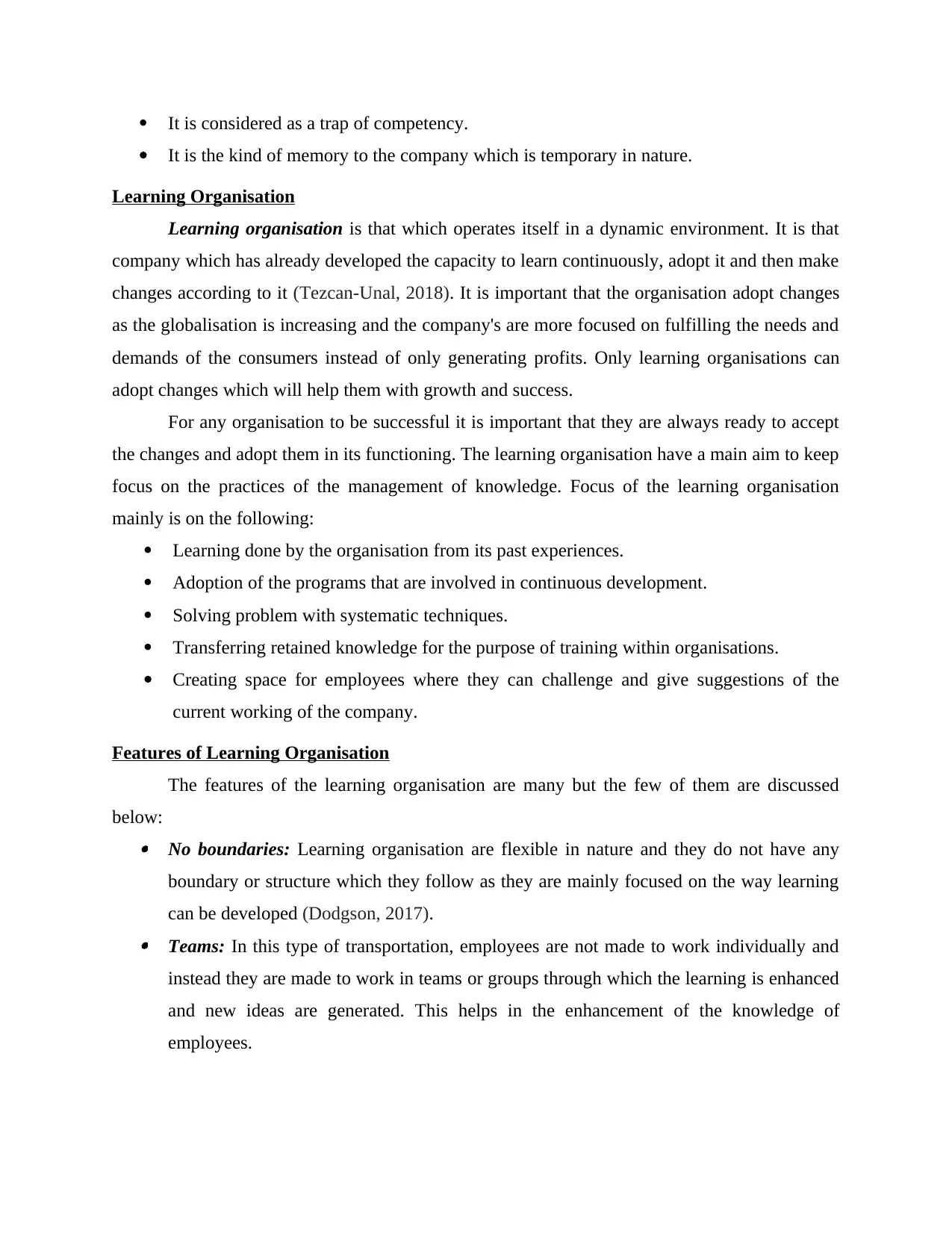
It is considered as a trap of competency.
It is the kind of memory to the company which is temporary in nature.
Learning Organisation
Learning organisation is that which operates itself in a dynamic environment. It is that
company which has already developed the capacity to learn continuously, adopt it and then make
changes according to it (Tezcan-Unal, 2018). It is important that the organisation adopt changes
as the globalisation is increasing and the company's are more focused on fulfilling the needs and
demands of the consumers instead of only generating profits. Only learning organisations can
adopt changes which will help them with growth and success.
For any organisation to be successful it is important that they are always ready to accept
the changes and adopt them in its functioning. The learning organisation have a main aim to keep
focus on the practices of the management of knowledge. Focus of the learning organisation
mainly is on the following:
Learning done by the organisation from its past experiences.
Adoption of the programs that are involved in continuous development.
Solving problem with systematic techniques.
Transferring retained knowledge for the purpose of training within organisations.
Creating space for employees where they can challenge and give suggestions of the
current working of the company.
Features of Learning Organisation
The features of the learning organisation are many but the few of them are discussed
below: No boundaries: Learning organisation are flexible in nature and they do not have any
boundary or structure which they follow as they are mainly focused on the way learning
can be developed (Dodgson, 2017). Teams: In this type of transportation, employees are not made to work individually and
instead they are made to work in teams or groups through which the learning is enhanced
and new ideas are generated. This helps in the enhancement of the knowledge of
employees.
It is the kind of memory to the company which is temporary in nature.
Learning Organisation
Learning organisation is that which operates itself in a dynamic environment. It is that
company which has already developed the capacity to learn continuously, adopt it and then make
changes according to it (Tezcan-Unal, 2018). It is important that the organisation adopt changes
as the globalisation is increasing and the company's are more focused on fulfilling the needs and
demands of the consumers instead of only generating profits. Only learning organisations can
adopt changes which will help them with growth and success.
For any organisation to be successful it is important that they are always ready to accept
the changes and adopt them in its functioning. The learning organisation have a main aim to keep
focus on the practices of the management of knowledge. Focus of the learning organisation
mainly is on the following:
Learning done by the organisation from its past experiences.
Adoption of the programs that are involved in continuous development.
Solving problem with systematic techniques.
Transferring retained knowledge for the purpose of training within organisations.
Creating space for employees where they can challenge and give suggestions of the
current working of the company.
Features of Learning Organisation
The features of the learning organisation are many but the few of them are discussed
below: No boundaries: Learning organisation are flexible in nature and they do not have any
boundary or structure which they follow as they are mainly focused on the way learning
can be developed (Dodgson, 2017). Teams: In this type of transportation, employees are not made to work individually and
instead they are made to work in teams or groups through which the learning is enhanced
and new ideas are generated. This helps in the enhancement of the knowledge of
employees.
⊘ This is a preview!⊘
Do you want full access?
Subscribe today to unlock all pages.

Trusted by 1+ million students worldwide
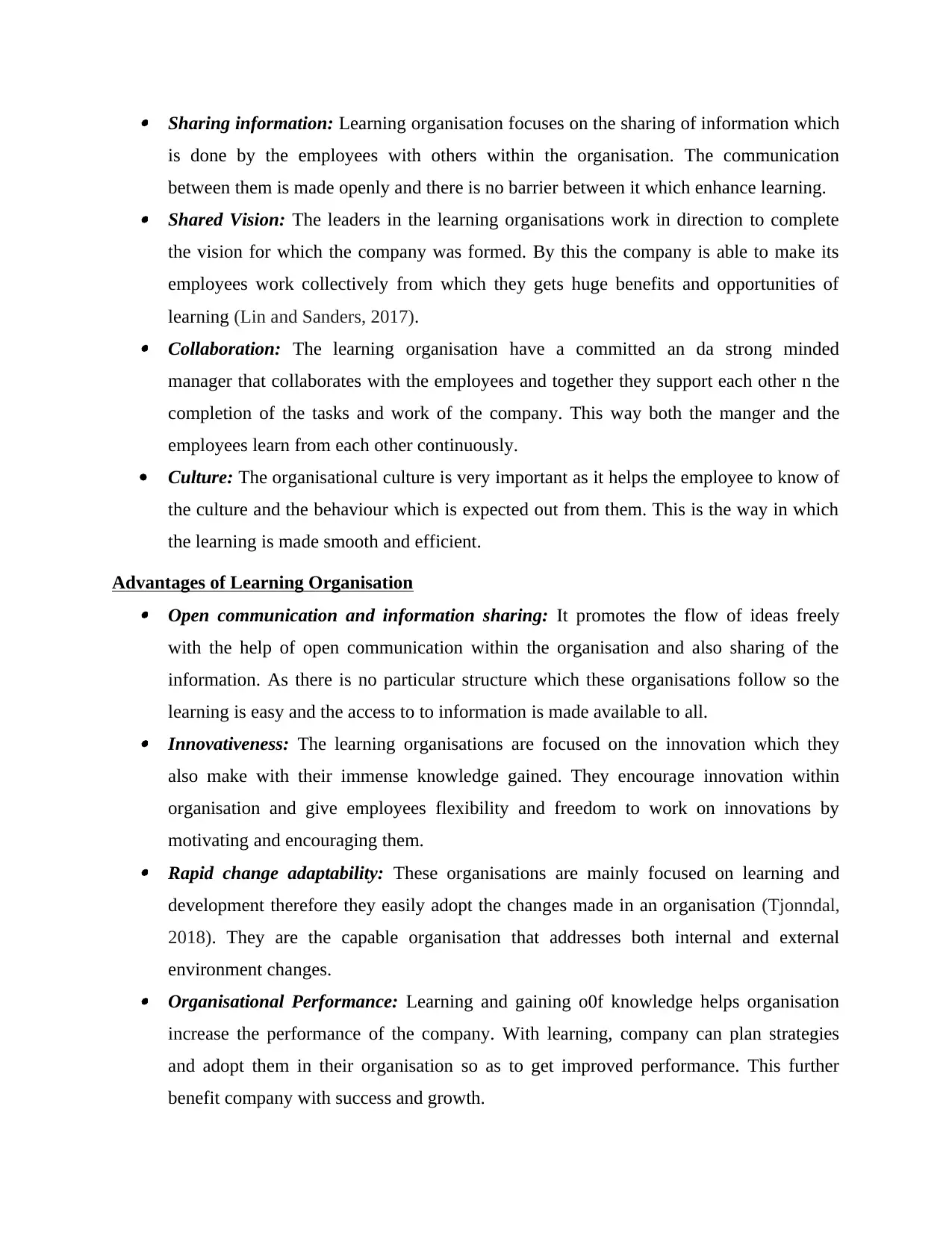
Sharing information: Learning organisation focuses on the sharing of information which
is done by the employees with others within the organisation. The communication
between them is made openly and there is no barrier between it which enhance learning. Shared Vision: The leaders in the learning organisations work in direction to complete
the vision for which the company was formed. By this the company is able to make its
employees work collectively from which they gets huge benefits and opportunities of
learning (Lin and Sanders, 2017). Collaboration: The learning organisation have a committed an da strong minded
manager that collaborates with the employees and together they support each other n the
completion of the tasks and work of the company. This way both the manger and the
employees learn from each other continuously.
Culture: The organisational culture is very important as it helps the employee to know of
the culture and the behaviour which is expected out from them. This is the way in which
the learning is made smooth and efficient.
Advantages of Learning Organisation Open communication and information sharing: It promotes the flow of ideas freely
with the help of open communication within the organisation and also sharing of the
information. As there is no particular structure which these organisations follow so the
learning is easy and the access to to information is made available to all. Innovativeness: The learning organisations are focused on the innovation which they
also make with their immense knowledge gained. They encourage innovation within
organisation and give employees flexibility and freedom to work on innovations by
motivating and encouraging them. Rapid change adaptability: These organisations are mainly focused on learning and
development therefore they easily adopt the changes made in an organisation (Tjonndal,
2018). They are the capable organisation that addresses both internal and external
environment changes. Organisational Performance: Learning and gaining o0f knowledge helps organisation
increase the performance of the company. With learning, company can plan strategies
and adopt them in their organisation so as to get improved performance. This further
benefit company with success and growth.
is done by the employees with others within the organisation. The communication
between them is made openly and there is no barrier between it which enhance learning. Shared Vision: The leaders in the learning organisations work in direction to complete
the vision for which the company was formed. By this the company is able to make its
employees work collectively from which they gets huge benefits and opportunities of
learning (Lin and Sanders, 2017). Collaboration: The learning organisation have a committed an da strong minded
manager that collaborates with the employees and together they support each other n the
completion of the tasks and work of the company. This way both the manger and the
employees learn from each other continuously.
Culture: The organisational culture is very important as it helps the employee to know of
the culture and the behaviour which is expected out from them. This is the way in which
the learning is made smooth and efficient.
Advantages of Learning Organisation Open communication and information sharing: It promotes the flow of ideas freely
with the help of open communication within the organisation and also sharing of the
information. As there is no particular structure which these organisations follow so the
learning is easy and the access to to information is made available to all. Innovativeness: The learning organisations are focused on the innovation which they
also make with their immense knowledge gained. They encourage innovation within
organisation and give employees flexibility and freedom to work on innovations by
motivating and encouraging them. Rapid change adaptability: These organisations are mainly focused on learning and
development therefore they easily adopt the changes made in an organisation (Tjonndal,
2018). They are the capable organisation that addresses both internal and external
environment changes. Organisational Performance: Learning and gaining o0f knowledge helps organisation
increase the performance of the company. With learning, company can plan strategies
and adopt them in their organisation so as to get improved performance. This further
benefit company with success and growth.
Paraphrase This Document
Need a fresh take? Get an instant paraphrase of this document with our AI Paraphraser
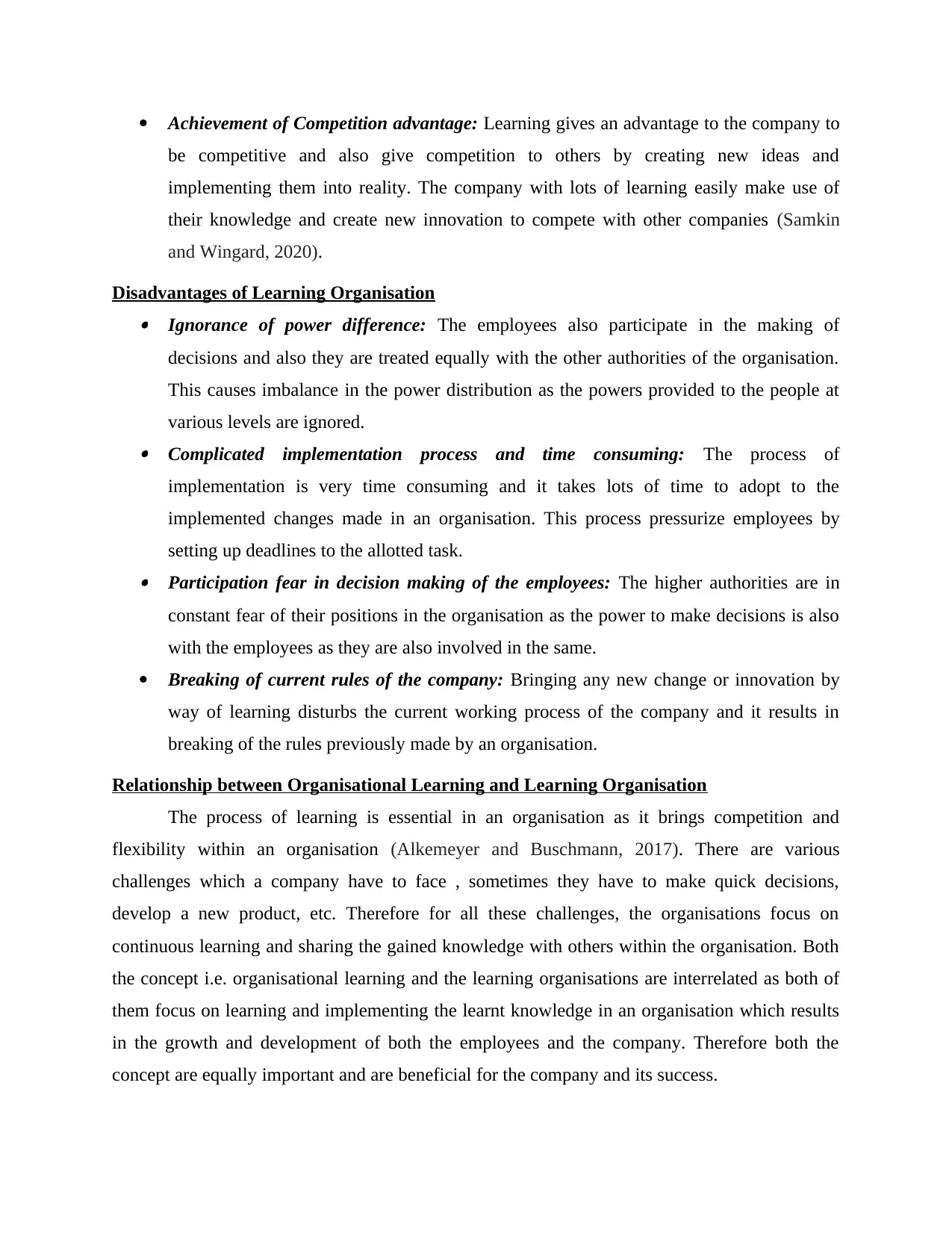
Achievement of Competition advantage: Learning gives an advantage to the company to
be competitive and also give competition to others by creating new ideas and
implementing them into reality. The company with lots of learning easily make use of
their knowledge and create new innovation to compete with other companies (Samkin
and Wingard, 2020).
Disadvantages of Learning Organisation Ignorance of power difference: The employees also participate in the making of
decisions and also they are treated equally with the other authorities of the organisation.
This causes imbalance in the power distribution as the powers provided to the people at
various levels are ignored. Complicated implementation process and time consuming: The process of
implementation is very time consuming and it takes lots of time to adopt to the
implemented changes made in an organisation. This process pressurize employees by
setting up deadlines to the allotted task. Participation fear in decision making of the employees: The higher authorities are in
constant fear of their positions in the organisation as the power to make decisions is also
with the employees as they are also involved in the same.
Breaking of current rules of the company: Bringing any new change or innovation by
way of learning disturbs the current working process of the company and it results in
breaking of the rules previously made by an organisation.
Relationship between Organisational Learning and Learning Organisation
The process of learning is essential in an organisation as it brings competition and
flexibility within an organisation (Alkemeyer and Buschmann, 2017). There are various
challenges which a company have to face , sometimes they have to make quick decisions,
develop a new product, etc. Therefore for all these challenges, the organisations focus on
continuous learning and sharing the gained knowledge with others within the organisation. Both
the concept i.e. organisational learning and the learning organisations are interrelated as both of
them focus on learning and implementing the learnt knowledge in an organisation which results
in the growth and development of both the employees and the company. Therefore both the
concept are equally important and are beneficial for the company and its success.
be competitive and also give competition to others by creating new ideas and
implementing them into reality. The company with lots of learning easily make use of
their knowledge and create new innovation to compete with other companies (Samkin
and Wingard, 2020).
Disadvantages of Learning Organisation Ignorance of power difference: The employees also participate in the making of
decisions and also they are treated equally with the other authorities of the organisation.
This causes imbalance in the power distribution as the powers provided to the people at
various levels are ignored. Complicated implementation process and time consuming: The process of
implementation is very time consuming and it takes lots of time to adopt to the
implemented changes made in an organisation. This process pressurize employees by
setting up deadlines to the allotted task. Participation fear in decision making of the employees: The higher authorities are in
constant fear of their positions in the organisation as the power to make decisions is also
with the employees as they are also involved in the same.
Breaking of current rules of the company: Bringing any new change or innovation by
way of learning disturbs the current working process of the company and it results in
breaking of the rules previously made by an organisation.
Relationship between Organisational Learning and Learning Organisation
The process of learning is essential in an organisation as it brings competition and
flexibility within an organisation (Alkemeyer and Buschmann, 2017). There are various
challenges which a company have to face , sometimes they have to make quick decisions,
develop a new product, etc. Therefore for all these challenges, the organisations focus on
continuous learning and sharing the gained knowledge with others within the organisation. Both
the concept i.e. organisational learning and the learning organisations are interrelated as both of
them focus on learning and implementing the learnt knowledge in an organisation which results
in the growth and development of both the employees and the company. Therefore both the
concept are equally important and are beneficial for the company and its success.
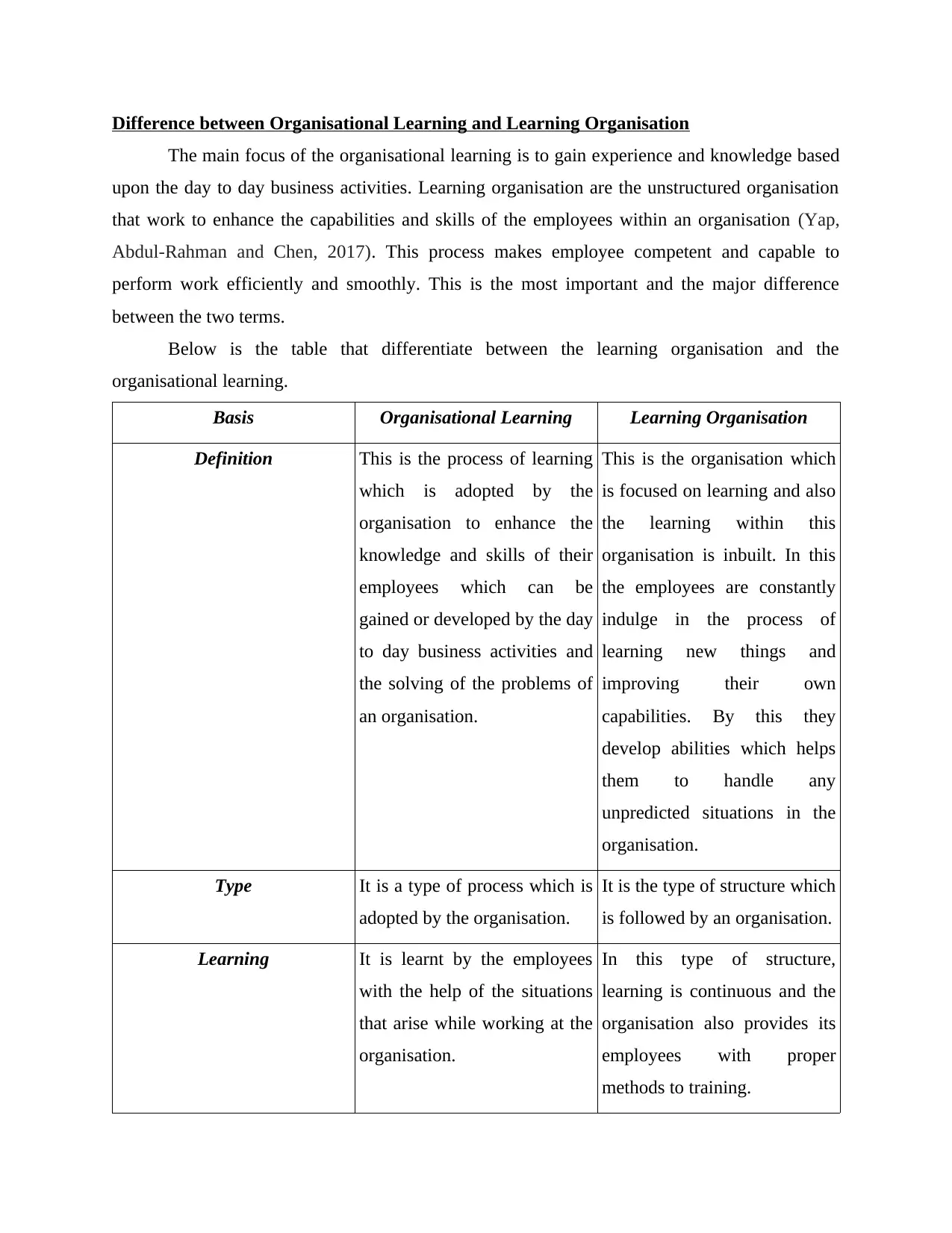
Difference between Organisational Learning and Learning Organisation
The main focus of the organisational learning is to gain experience and knowledge based
upon the day to day business activities. Learning organisation are the unstructured organisation
that work to enhance the capabilities and skills of the employees within an organisation (Yap,
Abdul-Rahman and Chen, 2017). This process makes employee competent and capable to
perform work efficiently and smoothly. This is the most important and the major difference
between the two terms.
Below is the table that differentiate between the learning organisation and the
organisational learning.
Basis Organisational Learning Learning Organisation
Definition This is the process of learning
which is adopted by the
organisation to enhance the
knowledge and skills of their
employees which can be
gained or developed by the day
to day business activities and
the solving of the problems of
an organisation.
This is the organisation which
is focused on learning and also
the learning within this
organisation is inbuilt. In this
the employees are constantly
indulge in the process of
learning new things and
improving their own
capabilities. By this they
develop abilities which helps
them to handle any
unpredicted situations in the
organisation.
Type It is a type of process which is
adopted by the organisation.
It is the type of structure which
is followed by an organisation.
Learning It is learnt by the employees
with the help of the situations
that arise while working at the
organisation.
In this type of structure,
learning is continuous and the
organisation also provides its
employees with proper
methods to training.
The main focus of the organisational learning is to gain experience and knowledge based
upon the day to day business activities. Learning organisation are the unstructured organisation
that work to enhance the capabilities and skills of the employees within an organisation (Yap,
Abdul-Rahman and Chen, 2017). This process makes employee competent and capable to
perform work efficiently and smoothly. This is the most important and the major difference
between the two terms.
Below is the table that differentiate between the learning organisation and the
organisational learning.
Basis Organisational Learning Learning Organisation
Definition This is the process of learning
which is adopted by the
organisation to enhance the
knowledge and skills of their
employees which can be
gained or developed by the day
to day business activities and
the solving of the problems of
an organisation.
This is the organisation which
is focused on learning and also
the learning within this
organisation is inbuilt. In this
the employees are constantly
indulge in the process of
learning new things and
improving their own
capabilities. By this they
develop abilities which helps
them to handle any
unpredicted situations in the
organisation.
Type It is a type of process which is
adopted by the organisation.
It is the type of structure which
is followed by an organisation.
Learning It is learnt by the employees
with the help of the situations
that arise while working at the
organisation.
In this type of structure,
learning is continuous and the
organisation also provides its
employees with proper
methods to training.
⊘ This is a preview!⊘
Do you want full access?
Subscribe today to unlock all pages.

Trusted by 1+ million students worldwide
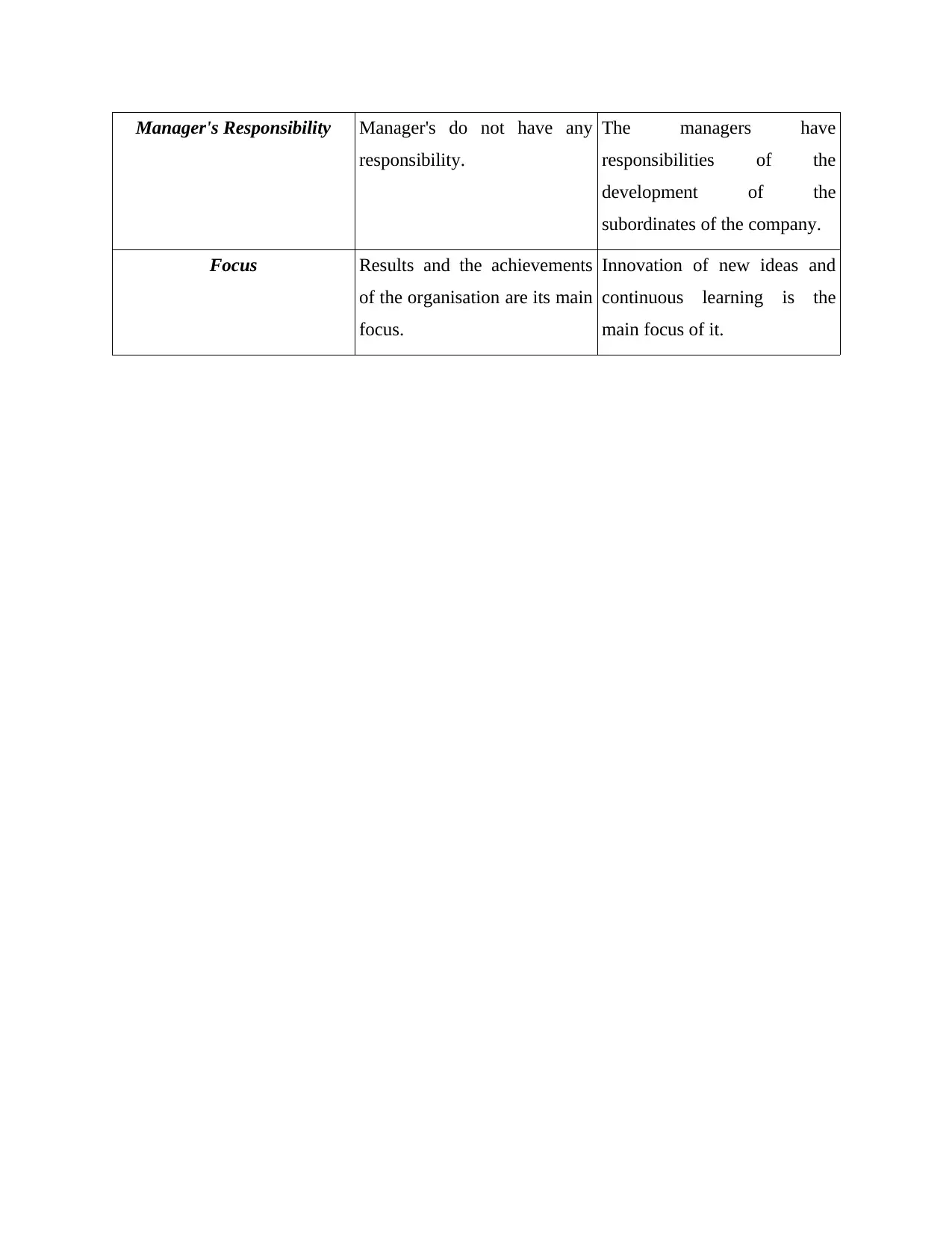
Manager's Responsibility Manager's do not have any
responsibility.
The managers have
responsibilities of the
development of the
subordinates of the company.
Focus Results and the achievements
of the organisation are its main
focus.
Innovation of new ideas and
continuous learning is the
main focus of it.
responsibility.
The managers have
responsibilities of the
development of the
subordinates of the company.
Focus Results and the achievements
of the organisation are its main
focus.
Innovation of new ideas and
continuous learning is the
main focus of it.
Paraphrase This Document
Need a fresh take? Get an instant paraphrase of this document with our AI Paraphraser
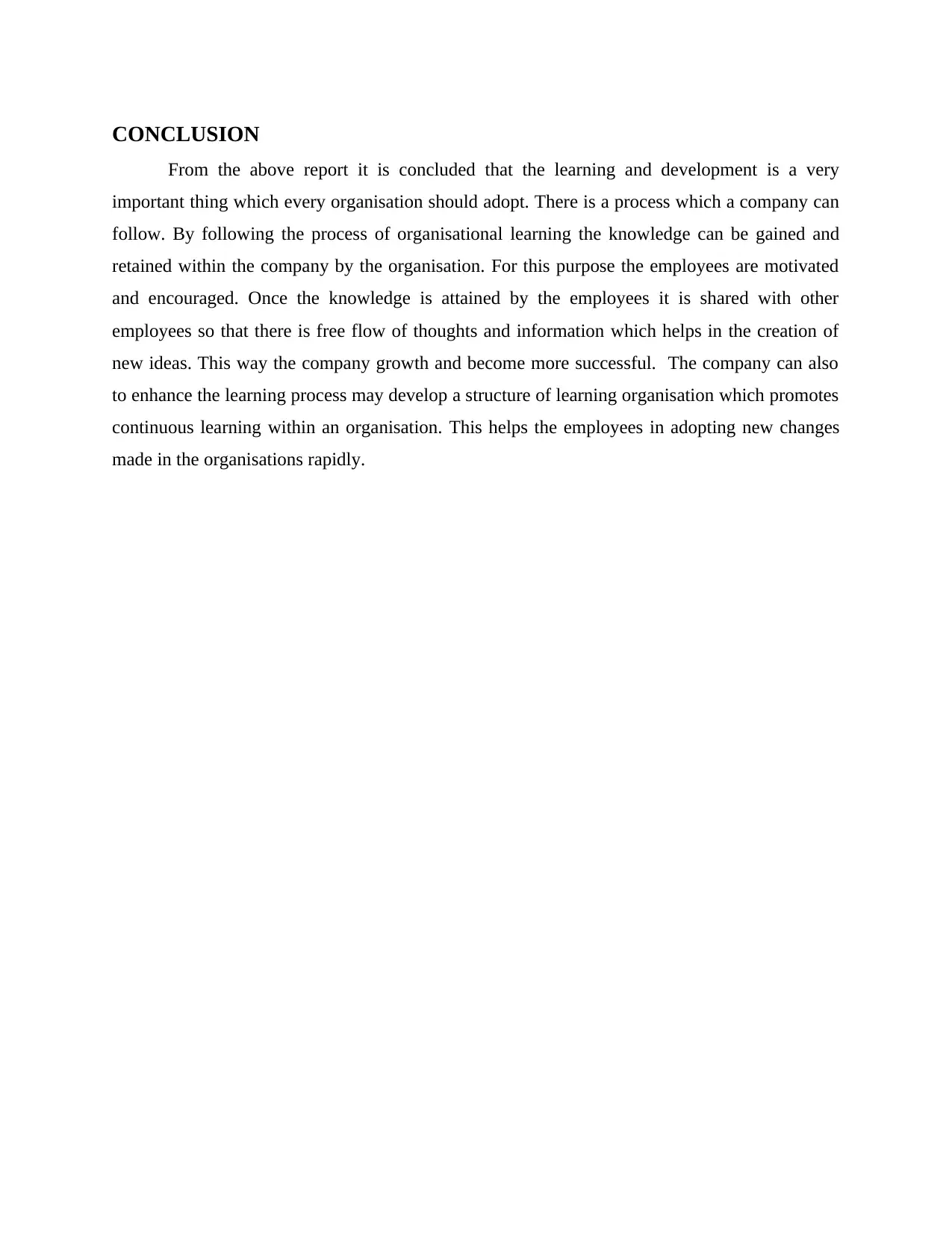
CONCLUSION
From the above report it is concluded that the learning and development is a very
important thing which every organisation should adopt. There is a process which a company can
follow. By following the process of organisational learning the knowledge can be gained and
retained within the company by the organisation. For this purpose the employees are motivated
and encouraged. Once the knowledge is attained by the employees it is shared with other
employees so that there is free flow of thoughts and information which helps in the creation of
new ideas. This way the company growth and become more successful. The company can also
to enhance the learning process may develop a structure of learning organisation which promotes
continuous learning within an organisation. This helps the employees in adopting new changes
made in the organisations rapidly.
From the above report it is concluded that the learning and development is a very
important thing which every organisation should adopt. There is a process which a company can
follow. By following the process of organisational learning the knowledge can be gained and
retained within the company by the organisation. For this purpose the employees are motivated
and encouraged. Once the knowledge is attained by the employees it is shared with other
employees so that there is free flow of thoughts and information which helps in the creation of
new ideas. This way the company growth and become more successful. The company can also
to enhance the learning process may develop a structure of learning organisation which promotes
continuous learning within an organisation. This helps the employees in adopting new changes
made in the organisations rapidly.
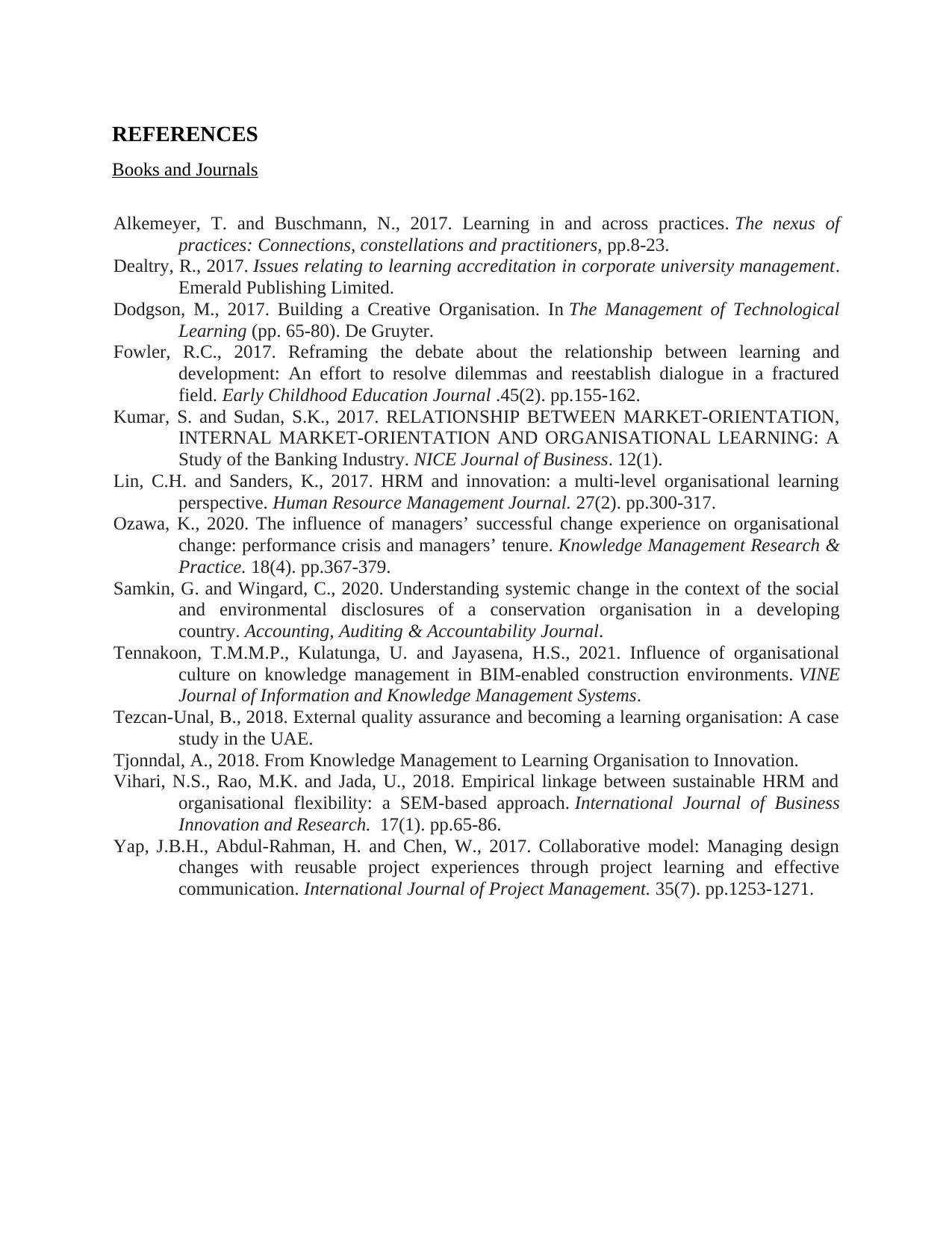
REFERENCES
Books and Journals
Alkemeyer, T. and Buschmann, N., 2017. Learning in and across practices. The nexus of
practices: Connections, constellations and practitioners, pp.8-23.
Dealtry, R., 2017. Issues relating to learning accreditation in corporate university management.
Emerald Publishing Limited.
Dodgson, M., 2017. Building a Creative Organisation. In The Management of Technological
Learning (pp. 65-80). De Gruyter.
Fowler, R.C., 2017. Reframing the debate about the relationship between learning and
development: An effort to resolve dilemmas and reestablish dialogue in a fractured
field. Early Childhood Education Journal .45(2). pp.155-162.
Kumar, S. and Sudan, S.K., 2017. RELATIONSHIP BETWEEN MARKET-ORIENTATION,
INTERNAL MARKET-ORIENTATION AND ORGANISATIONAL LEARNING: A
Study of the Banking Industry. NICE Journal of Business. 12(1).
Lin, C.H. and Sanders, K., 2017. HRM and innovation: a multi‐level organisational learning
perspective. Human Resource Management Journal. 27(2). pp.300-317.
Ozawa, K., 2020. The influence of managers’ successful change experience on organisational
change: performance crisis and managers’ tenure. Knowledge Management Research &
Practice. 18(4). pp.367-379.
Samkin, G. and Wingard, C., 2020. Understanding systemic change in the context of the social
and environmental disclosures of a conservation organisation in a developing
country. Accounting, Auditing & Accountability Journal.
Tennakoon, T.M.M.P., Kulatunga, U. and Jayasena, H.S., 2021. Influence of organisational
culture on knowledge management in BIM-enabled construction environments. VINE
Journal of Information and Knowledge Management Systems.
Tezcan-Unal, B., 2018. External quality assurance and becoming a learning organisation: A case
study in the UAE.
Tjonndal, A., 2018. From Knowledge Management to Learning Organisation to Innovation.
Vihari, N.S., Rao, M.K. and Jada, U., 2018. Empirical linkage between sustainable HRM and
organisational flexibility: a SEM-based approach. International Journal of Business
Innovation and Research. 17(1). pp.65-86.
Yap, J.B.H., Abdul-Rahman, H. and Chen, W., 2017. Collaborative model: Managing design
changes with reusable project experiences through project learning and effective
communication. International Journal of Project Management. 35(7). pp.1253-1271.
Books and Journals
Alkemeyer, T. and Buschmann, N., 2017. Learning in and across practices. The nexus of
practices: Connections, constellations and practitioners, pp.8-23.
Dealtry, R., 2017. Issues relating to learning accreditation in corporate university management.
Emerald Publishing Limited.
Dodgson, M., 2017. Building a Creative Organisation. In The Management of Technological
Learning (pp. 65-80). De Gruyter.
Fowler, R.C., 2017. Reframing the debate about the relationship between learning and
development: An effort to resolve dilemmas and reestablish dialogue in a fractured
field. Early Childhood Education Journal .45(2). pp.155-162.
Kumar, S. and Sudan, S.K., 2017. RELATIONSHIP BETWEEN MARKET-ORIENTATION,
INTERNAL MARKET-ORIENTATION AND ORGANISATIONAL LEARNING: A
Study of the Banking Industry. NICE Journal of Business. 12(1).
Lin, C.H. and Sanders, K., 2017. HRM and innovation: a multi‐level organisational learning
perspective. Human Resource Management Journal. 27(2). pp.300-317.
Ozawa, K., 2020. The influence of managers’ successful change experience on organisational
change: performance crisis and managers’ tenure. Knowledge Management Research &
Practice. 18(4). pp.367-379.
Samkin, G. and Wingard, C., 2020. Understanding systemic change in the context of the social
and environmental disclosures of a conservation organisation in a developing
country. Accounting, Auditing & Accountability Journal.
Tennakoon, T.M.M.P., Kulatunga, U. and Jayasena, H.S., 2021. Influence of organisational
culture on knowledge management in BIM-enabled construction environments. VINE
Journal of Information and Knowledge Management Systems.
Tezcan-Unal, B., 2018. External quality assurance and becoming a learning organisation: A case
study in the UAE.
Tjonndal, A., 2018. From Knowledge Management to Learning Organisation to Innovation.
Vihari, N.S., Rao, M.K. and Jada, U., 2018. Empirical linkage between sustainable HRM and
organisational flexibility: a SEM-based approach. International Journal of Business
Innovation and Research. 17(1). pp.65-86.
Yap, J.B.H., Abdul-Rahman, H. and Chen, W., 2017. Collaborative model: Managing design
changes with reusable project experiences through project learning and effective
communication. International Journal of Project Management. 35(7). pp.1253-1271.
⊘ This is a preview!⊘
Do you want full access?
Subscribe today to unlock all pages.

Trusted by 1+ million students worldwide
1 out of 12
Related Documents
Your All-in-One AI-Powered Toolkit for Academic Success.
+13062052269
info@desklib.com
Available 24*7 on WhatsApp / Email
![[object Object]](/_next/static/media/star-bottom.7253800d.svg)
Unlock your academic potential
Copyright © 2020–2026 A2Z Services. All Rights Reserved. Developed and managed by ZUCOL.





